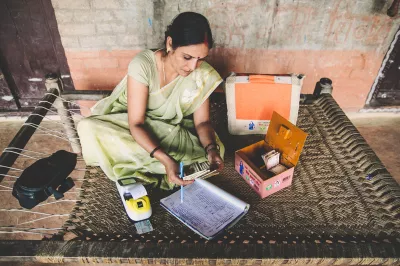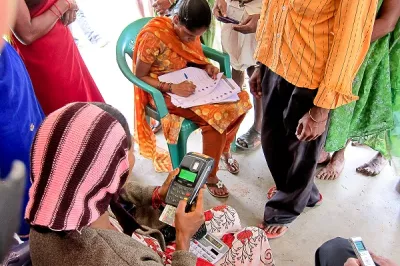Eko’s Mobile Banking: A Basic Payments Product
Eko was the first company dedicated to a mobile phone-based basic savings account and payment service for the unbanked in India. Launched in 2007, Eko has carefully developed a mobile-based service usable on the most basic of handsets and continually revised and re-fashioned its approach. At first, Eko experimented with a basic deposit and payment service from one Eko account to another. But by the second half of 2011 Eko had struck on a revised formula that appeared to work as a business – providing a highly efficient and simple payment directly into the account of a bank anywhere in India. Having found a popular offering, during the second half of 2011 Eko doubled its revenues, reducing its operating losses to 16% of revenue by February 2012 with the expectation of passing breakeven in the first half of 2012.
Leveraging a strong base of agents in Delhi, Eko offers users a simple way to send money anywhere in India. Users can come to Eko’s agents to make a deposit into any bank account held by the State Bank of India (SBI). SBI is the largest bank in India with over 14,000 branches and more than 250 million accounts. By presenting the mobile number of the sender and receiver to the Eko agent, plus the account number of the receiver, the agent can make a payment into the account securely simply by dialing a short sequence of numbers. Each transaction is then verified by an SMS to both sender and receiver with a time and date stamp, the fees levied and a transaction ID.
The success of this tatkal payment service is predicated on two basic features. The first is that Eko’s service ties into the core banking system of SBI on a real-time basis. Thus, clients send and receive transactions instantly giving them confidence. The power of the service is persuasive to clients as the receivers simply withdraw the funds from any SBI channel across India. This includes a national network of interoperable ATMs which charge no fee on most withdrawals.
The second important feature is simplicity. Clients only need to know the correct account number and the sending and (optionally) the receiving phone numbers. And they only need to go to an authorized agent to complete the transaction. This is more convenient than getting to branches which may be further away and often require longer waits. “The big difference for Eko has been the irrefutable legitimacy that tatkal transactions bring to the SBI-Eko outlets. The fact that the client’s relative thousands of kilometers away can instantly withdraw cash at an ATM just a few seconds after the transaction completes is a definite ‘Wow!’ for the client”, says Abhishek Sinha, co-founder & CEO of Eko.
The tatkal service is driven by 300 of Eko’s most active agents in and around Delhi who each complete 150 to 200 transactions per day. These transactions are capped at $200 and most hover around $80 in value. Not only are clients adopting the service, but the business is a popular new source of income for Eko’s agents – upwards of $20 in fees can be earned in a day, a figure much higher than the $1-5 often earned by agents in India. As a result, there is increasing demand to become an Eko agent.
This service processed on behalf of SBI charges the client a sending fee of 2.5% for lower values (about $20), and between 1-2% for higher ranges between $100-200. This fee is shared between Eko and SBI. And Eko then shares a portion of the fee with the agent. In the last 9 months alone, Eko has processed more than 1.1 million transactions valued at over $800,000.
The Eko progress illustrates the power of a simple and fast service, and also the importance of iterating on an initial concept to meet the demands of the market. Of course the importance of Eko’s progress lies in its promise as a viable business reaching the masses across India. Such uptake provides both Eko and its bank partner the anchor product upon which other services might eventually be added to further financial inclusion. Although this service requires an existing account, it does show how the service could be leveraged by other banks to begin to build the agent network required to offer a wider array of financial services.




Add new comment